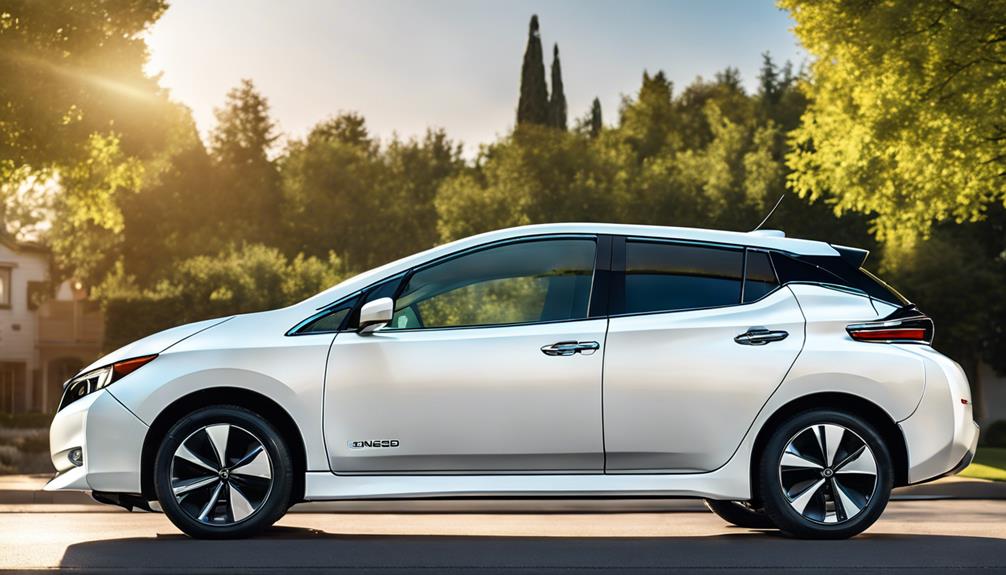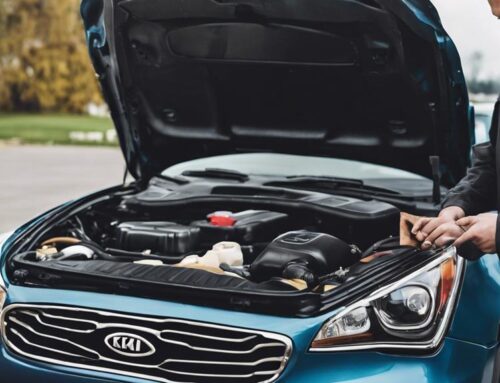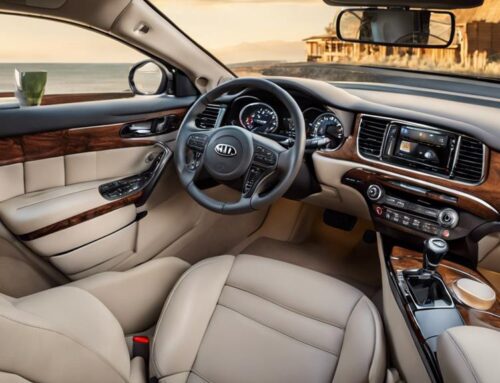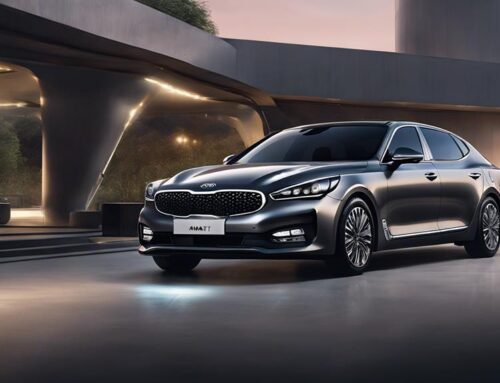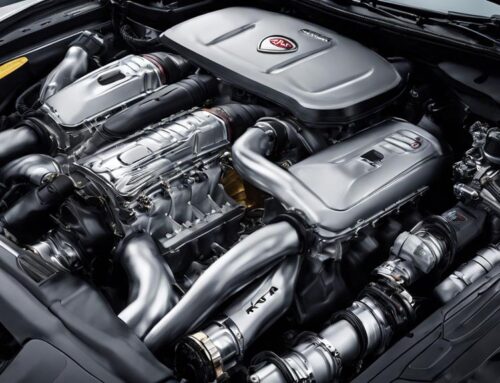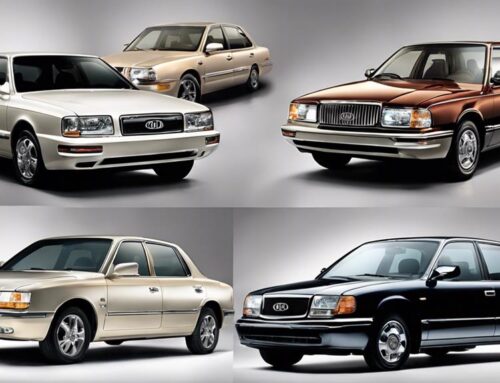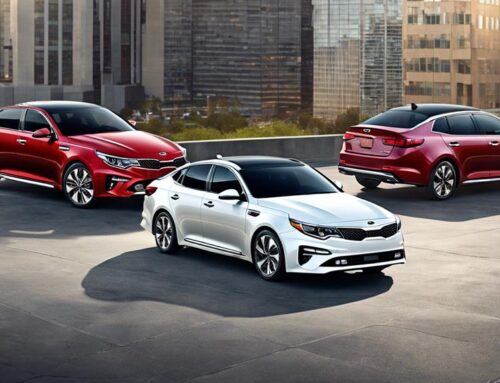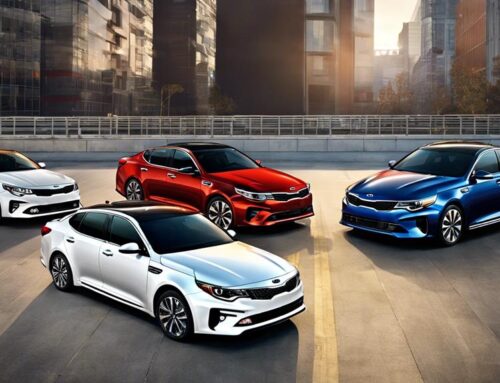The Nissan Leaf, launched in 2010, stands as a trailblazer in the electric vehicle market. You'll appreciate its options of 40 kWh and 62 kWh batteries, giving a range of up to 226 miles. The electric motor packs 147-214 horsepower and includes features like regenerative braking and the E-Pedal for enhanced efficiency. The sleek exterior complements a tech-packed and eco-friendly interior. With zero emissions and advanced driver-assistance systems, the Leaf aligns well with environmental goals. While its range and charging times have mixed reviews, it remains competitively priced and loaded with modern tech. Explore further to see how the Leaf compares to other EVs.
Key Takeaways
- The Nissan Leaf offers two battery options: a 40 kWh standard and a 62 kWh optional, providing ranges up to 149 and 226 miles respectively.
- Introduced in 2010, the Nissan Leaf has advanced driver-assistance technologies and has evolved significantly in design and performance since its launch.
- The electric motor delivers between 147 and 214 horsepower, featuring regenerative braking and E-Pedal for improved efficiency.
- The Leaf boasts an aerodynamic design, eco-conscious materials in the interior, and modern technology integration for a comfortable driving experience.
- Known for zero tailpipe emissions, the Nissan Leaf supports renewable energy charging and incorporates recycled materials, emphasizing sustainability.
Introduction to the Nissan Leaf
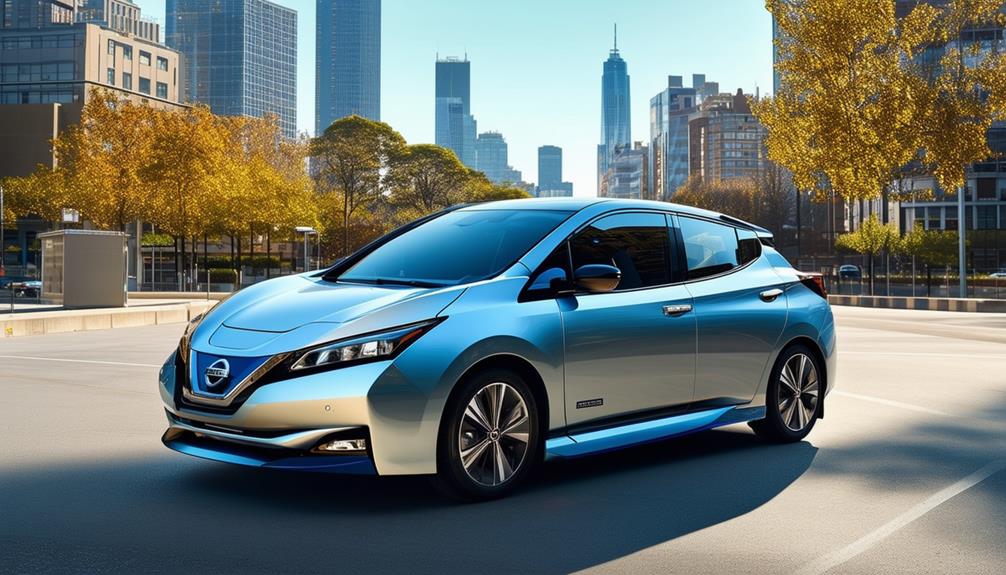
The Nissan Leaf, introduced in 2010, stands as one of the pioneers in the fully electric vehicle market. If you're looking for a car that embodies innovation and sustainability, the Leaf is a compelling choice. This vehicle leverages advanced electric motor technology to eliminate tailpipe emissions, making it a key player in sustainable transportation. Additionally, the Leaf is renowned for its battery technology, which has seen significant advancements over the years.
You won't find a traditional internal combustion engine under the hood. Instead, the Leaf uses a high-efficiency electric motor powered by a lithium-ion battery pack. This setup not only reduces your carbon footprint but also offers a quiet, smooth driving experience. The electric motor delivers instant torque, giving you impressive acceleration from a standstill.
One of the standout features is its regenerative braking system. When you apply the brakes, the system captures kinetic energy and converts it into electrical energy to recharge the battery. This process enhances energy efficiency and extends your driving range, making it a practical option for daily commutes and longer trips alike.
The Leaf also comes with a suite of smart features designed to optimize your driving experience. For instance, the NissanConnect EV system allows you to monitor battery status, find nearby charging stations, and even pre-condition the cabin temperature—all from your smartphone. These innovations highlight Nissan's commitment to making electric vehicles more convenient and user-friendly.
In terms of safety, the Leaf doesn't compromise. It includes advanced driver-assistance systems like automatic emergency braking, lane departure warning, and blind-spot monitoring. These features guarantee that you stay safe while contributing to a greener planet.
History and Evolution
Having explored the innovative characteristics and sustainable design of the Nissan Leaf, it's equally important to examine its history and evolution. The Nissan Leaf has been a pioneer in the electric vehicle (EV) market since its introduction in 2010. Let's dig into the significant milestones that have shaped its journey.
1. Initial Launch and Early Adoption (2010-2014)
When the Nissan Leaf first entered the global market, it marked a significant advancement in technological progress and sustainability efforts. It was the first widely available, all-electric vehicle, providing a practical option to gasoline-powered cars. Early sales trends showed strong interest, with over 100,000 units sold by mid-2014. This period also witnessed the Leaf establishing its reputation for dependability and efficiency, which played a vital role in establishing consumer confidence in EV technology.
2. Second Generation and Technological Upgrades (2017-Present)
In 2017, Nissan revealed the second-generation Leaf, featuring improved battery capacity, extended range, and advanced driver-assistance technologies. This version emphasized Nissan's dedication to innovation and sustainability efforts, integrating features like ProPILOT Assist and e-Pedal. The sales trends demonstrated a renewed interest, with the Leaf emerging as one of the top-selling EVs globally.
3. Ongoing Developments and Future Prospects
The Nissan Leaf continues to progress, with recent models integrating state-of-the-art technological advancements such as enhanced energy storage and quicker charging capabilities. As the worldwide market for EVs grows, Nissan remains at the forefront, consistently updating the Leaf to fulfill the increasing need for sustainable transportation solutions.
Key Specifications
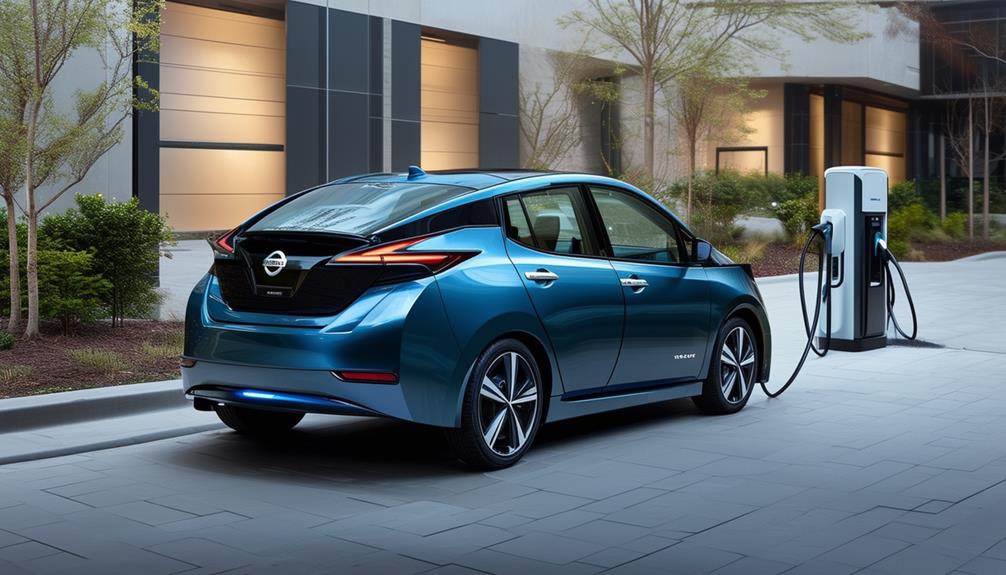
Nissan Leaf's key specifications showcase its cutting-edge engineering and commitment to sustainable mobility. At the heart of the Leaf lies its advanced battery technology, featuring a 40 kWh lithium-ion battery in the standard model and an optional 62 kWh battery for extended range. This battery setup not only contributes to the car's impressive driving range but also enhances its overall performance.
The standard battery offers up to 149 miles of driving range on a single charge, while the larger battery extends this to an impressive 226 miles, making the Leaf a versatile option for both urban commuting and longer journeys.
You'll appreciate the Leaf's electric motor, which delivers a robust 147 horsepower in the standard model and 214 horsepower in the extended range variant. This guarantees swift acceleration and smooth, responsive handling. The Leaf's regenerative braking system further optimizes energy efficiency by converting kinetic energy back into stored electrical energy during deceleration. Additionally, the advanced keyless entry system simplifies access to your vehicle, enhancing convenience.
Charging the Nissan Leaf is straightforward, with multiple options available to suit different needs. A standard 120V outlet can be used for overnight charging, while a 240V Level 2 charger significantly reduces charging time, replenishing the battery from empty to full in approximately 7.5 hours for the 40 kWh battery. For those in a hurry, the Leaf supports DC fast charging, allowing you to recharge up to 80% of the battery in just 40 minutes.
In terms of safety, the Leaf is equipped with advanced driver-assistance systems, including ProPILOT Assist, which combines adaptive cruise control and lane-keeping assistance to enhance driving comfort and safety. Overall, the Nissan Leaf's key specifications make it a formidable contender in the electric vehicle market, catering to drivers who prioritize innovation and sustainability.
Interior and Exterior Design
Upon first look, the Nissan Leaf's interior and exterior design showcases a fusion of modern aesthetics and functional engineering, aimed at providing you with a seamless driving experience. The fashionable exterior is defined by its aerodynamic lines and sleek silhouette, not only enhancing its visual appeal but also boosting efficiency. The distinctive V-Motion grille and boomerang-shaped LED headlights make a striking statement, ensuring that the Leaf stands out in any urban environment. For those interested in adding a personal touch, consider exploring some chic accessories to further enhance your Leaf's appeal.
Step inside, and you'll immediately appreciate the comfortable seating designed for optimal support during both brief commutes and long drives. The cabin is a prime example of eco-conscious materials, with recycled fabrics and soft-touch surfaces that reflect Nissan's dedication to sustainability. The roomy layout and cleverly designed storage compartments guarantee that both driver and passengers have sufficient space to unwind and store their essentials.
The Nissan Leaf doesn't just prioritize comfort and sustainability; it also integrates cutting-edge technology to enhance your driving experience. The digital dashboard and customizable display provide real-time information at a glance, from navigation to battery status. The infotainment system supports both Apple CarPlay and Android Auto, keeping you connected and entertained on the go.
Key Features:
- Fashionable Exterior: Aerodynamic design, V-Motion grille, boomerang-shaped LED headlights.
- Comfortable Seating: Ergonomic seats, spacious cabin, eco-conscious materials.
- Cutting-edge Technology: Digital dashboard, customizable display, Apple CarPlay, and Android Auto.
Performance Features
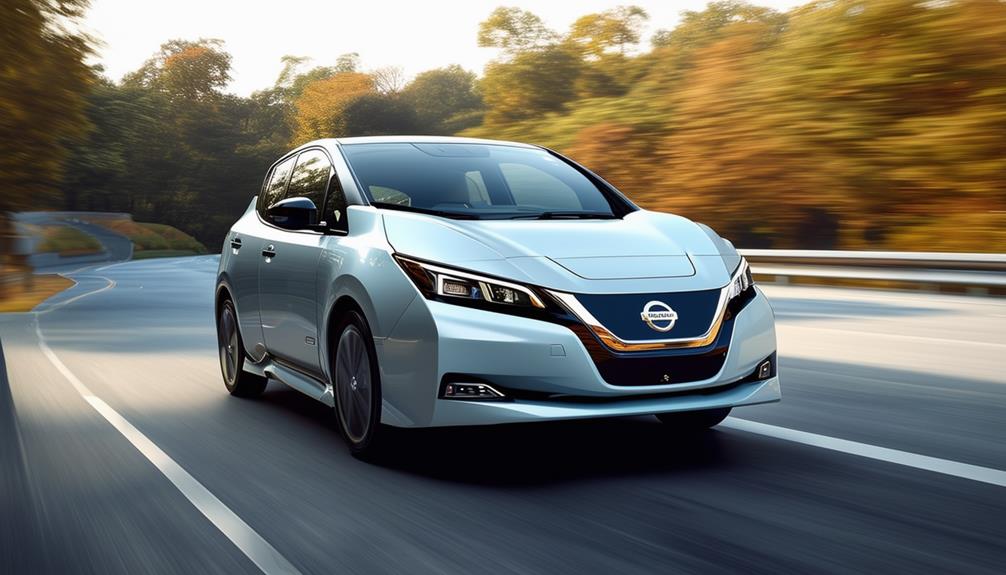
When it comes to performance features, the Nissan Leaf stands out as a formidable contender in the electric vehicle market. The Leaf's engineering excellence starts with its cutting-edge battery technology. Equipped with a 40 kWh or an optional 62 kWh lithium-ion battery, the Leaf offers a driving range that effectively addresses range anxiety. The standard 40 kWh battery provides up to 149 miles on a single charge, while the 62 kWh variant extends this to an impressive 226 miles, making long-distance travel more feasible and convenient. This impressive range is complemented by advanced safety features, such as smart entry and anti-theft technologies.
You'll appreciate the vehicle's electric motor, which delivers a swift and smooth driving experience. The 110 kW motor in the standard model produces 147 horsepower and 236 lb-ft of torque, ensuring rapid acceleration and agile handling. Opt for the Leaf Plus, and the motor is upgraded to 160 kW, boosting horsepower to 214 and torque to 250 lb-ft. This translates to a more exhilarating drive, whether you're maneuvering city streets or cruising on the highway.
The Nissan Leaf also features regenerative braking technology, which not only enhances efficiency by converting kinetic energy back into stored electricity but also adds to the overall driving range.
The E-Pedal system allows you to accelerate, decelerate, and stop using just one pedal, adding convenience and improving energy recovery.
Environmental Impact
Reducing carbon emissions and promoting sustainability are at the heart of the Nissan Leaf's design philosophy. You'll find that the Leaf isn't just another electric vehicle; it's a symbol of Nissan's dedication to sustainability initiatives. Let's explore how this vehicle influences the environment in a positive manner.
First and foremost, the Nissan Leaf is a zero-emission vehicle. By running solely on electric power, it completely eliminates tailpipe carbon emissions. This is a significant advancement compared to traditional internal combustion engine vehicles, which are well-known for their CO2 output. The Leaf's battery technology ensures that you contribute to reducing the overall carbon footprint. Moreover, the Nissan Leaf has been a key player in the changing EV landscape, showcasing the potential of electric vehicles to revolutionize the automotive industry.
Secondly, Nissan has taken significant steps to guarantee that the production and lifecycle of the Leaf align with sustainability initiatives. The company utilizes recycled materials in the manufacturing process, such as reused aluminum and plastic, thereby reducing waste and conserving natural resources.
Nissan's transparent approach to sourcing and recycling demonstrates a complete commitment to sustainability.
Lastly, the Leaf's energy efficiency is another important aspect. The vehicle can be charged using renewable energy sources, such as solar or wind power, further reducing its environmental impact. The advanced regenerative braking system also captures energy that would otherwise be lost, enhancing the vehicle's overall efficiency.
Here's a brief overview of the Nissan Leaf's environmental impact:
- Zero Tailpipe Emissions: Completely eliminates carbon emissions during operation.
- Recycled Materials: Uses environmentally friendly materials in manufacturing.
- Energy Efficiency: Supports renewable energy and incorporates regenerative braking.
User Reviews
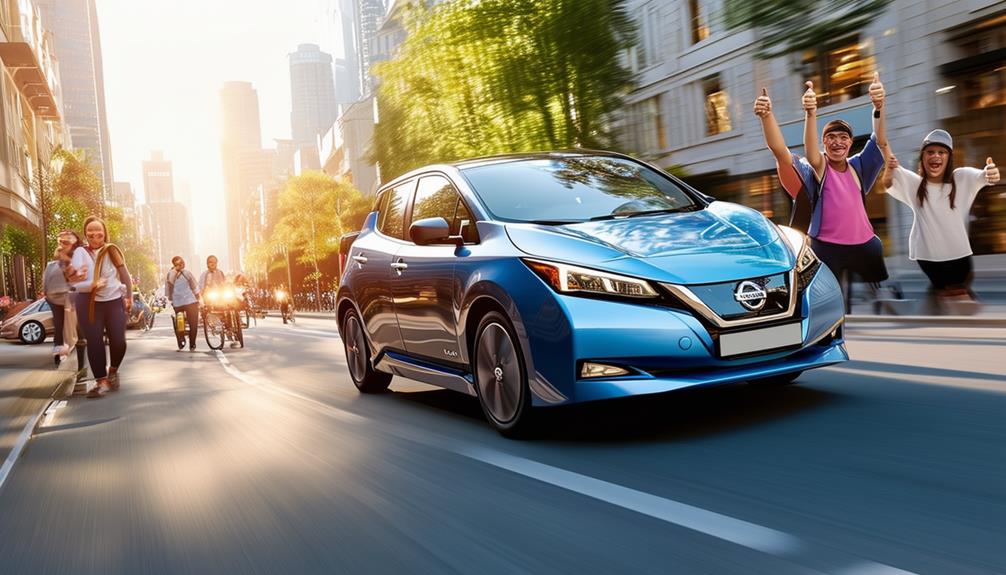
Diving into user reviews of the Nissan Leaf, you'll find a wealth of insights that spotlight both the strengths and areas for improvement in this popular electric vehicle. One of the recurring praises is for its battery range. Many users appreciate the Leaf's ability to cover substantial distances on a single charge, particularly in urban environments where daily commutes are short. According to the Ultimate Guide to owning a Nissan Leaf, the costs and maintenance are relatively low compared to traditional vehicles, adding to its appeal.
However, some users have noted that the range can vary significantly based on driving habits and weather conditions, which could be a concern for those relying on the vehicle for longer trips.
In terms of charging infrastructure, user feedback is generally positive but nuanced. Owners applaud the compatibility of the Nissan Leaf with a wide array of public charging stations, making it easy to recharge on the go. However, a common point of criticism is the inconsistency in charging speeds across different stations. While some high-speed chargers can replenish the battery rapidly, others can be sluggish, leading to longer wait times. This variability can be frustrating, particularly for those who don't have access to a home charging setup.
From an interior standpoint, users often highlight the Leaf's comfortable seating and intuitive dashboard design. The infotainment system, with its modern interface and connectivity options, also garners favorable reviews. Yet, some users feel that the build quality could be enhanced, especially considering the vehicle's price point.
Market Position
The Nissan Leaf occupies a unique position in the electric vehicle market, balancing affordability and functionality. This makes it an attractive choice for consumers seeking a dependable and cost-efficient entry into sustainable transportation. Let's explore why the Leaf stands out.
Firstly, the Nissan Leaf is competitively priced, making it one of the more accessible electric vehicles on the market. Its cost-effectiveness doesn't compromise quality or innovation, embodying the perfect blend of economical and advanced technology. With the inclusion of features like smart key systems, remote start, and mobile integration, the Leaf enhances convenience and driving pleasure for its users. For those aiming to switch to sustainable transportation without spending a fortune, the Leaf offers a compelling option.
Secondly, the Leaf's range and charging capabilities are designed to meet the daily needs of most drivers. With a range of up to 226 miles on a single charge for the Leaf Plus model, it's well-suited for both city commuting and short road trips. The availability of rapid charging stations guarantees you're never far from a quick recharge, minimizing downtime and maximizing convenience.
Thirdly, Nissan has invested significantly in the Leaf's technological features. From ProPILOT Assist to e-Pedal technology, you'll find a suite of innovative features aimed at enhancing driver experience and safety. These additions not only enhance the Leaf's market appeal but also highlight Nissan's commitment to spearheading advancements in electric vehicle technology.
Here's a quick summary:
- Affordability: A cost-efficient entry into the world of electric vehicles.
- Range and Charging: Adequate range for daily use and rapid charging options.
- Technological Features: Advanced driver assistance and unique driving technologies.
Nissan Leaf Competitors
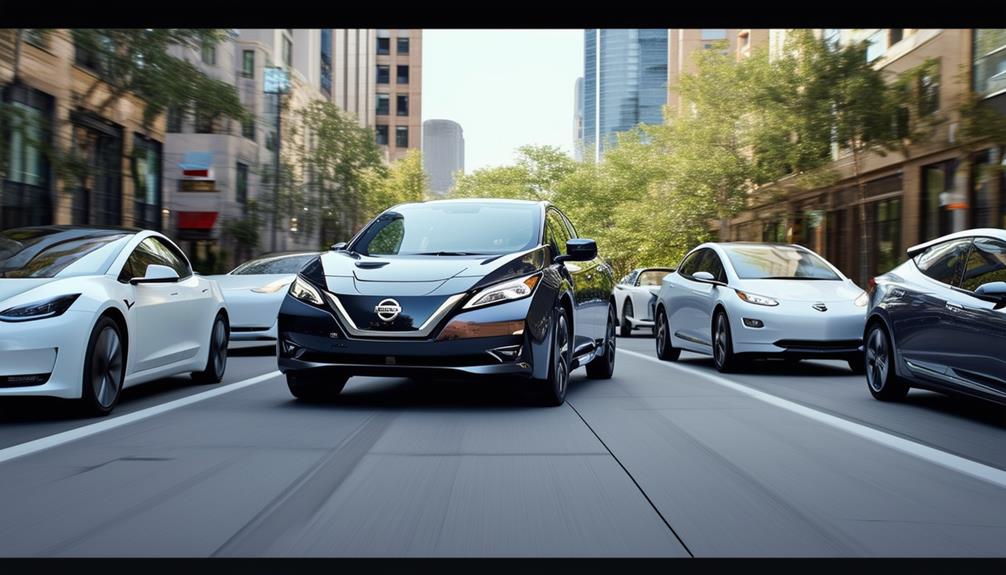
While the Nissan Leaf excels in affordability, range, and technological features, it's important to evaluate its position against other electric vehicles in the market. When you consider the Leaf, you should also compare it with competitors like the Tesla Model 3, Chevrolet Bolt EV, and Hyundai Kona Electric. Each of these vehicles provides unique benefits that can influence your decision.
For example, the Nissan Leaf key replacement services provided by Low Rate Locksmith highlight the practical aspects of ownership, such as ease of maintaining and replacing keys, which could be a consideration for potential buyers.
The Tesla Model 3 is often hailed as the gold standard in electric vehicles. With its impressive range of up to 358 miles and access to Tesla's proprietary Supercharger network, it outshines the Leaf's maximum range of 226 miles. However, Tesla's higher price point may make the Leaf a more attractive option if affordability is a key factor for you.
Next, the Chevrolet Bolt EV offers a compelling alternative with a range of 259 miles, slightly better than the Leaf. It also features a more spacious interior, making it a good choice for those who need extra room. However, the Bolt EV lacks some advanced driver-assistance features standard in the Leaf, such as ProPILOT Assist.
The Hyundai Kona Electric stands out with its blend of range, performance, and features. Boasting a range of 258 miles and a more SUV-like design, it caters to those who prefer a higher driving position and additional cargo space. However, the Kona Electric's higher starting price might be a deterrent if budget constraints are a concern.
In your quest for sustainable transportation, the Nissan Leaf remains a strong contender. However, understanding the landscape of electric vehicles and evaluating your priorities will help you make an informed choice.
Future of the Nissan Leaf
Looking ahead, the future of the Nissan Leaf promises several advancements aimed at maintaining its competitiveness in the evolving electric vehicle market. As electric vehicle (EV) trends continue to shift toward increased efficiency and sustainability, the Nissan Leaf is poised to incorporate cutting-edge technologies and innovative features.
Firstly, you can expect significant sustainable progress. Nissan has been committed to reducing its carbon footprint, and the future iterations of the Leaf will likely feature more eco-friendly materials and manufacturing processes. This not only aligns with global environmental goals but also makes the vehicle more appealing to eco-conscious consumers. Additionally, addressing common issues such as battery concerns will be essential as the Leaf evolves.
Secondly, the Leaf will likely see improvements in battery technology. As battery efficiency improves across the industry, you can expect the Leaf to offer longer ranges and shorter charging times. This will be a vital factor in maintaining its market position, given that range anxiety remains a significant barrier to EV adoption.
Lastly, the integration of advanced driver-assistance systems (ADAS) and autonomous driving features will be pivotal. Nissan is investing heavily in these technologies, aiming to provide a safer and more convenient driving experience. The Leaf's future models are expected to include more sophisticated ADAS capabilities, enabling semi-autonomous driving under specific conditions.
Here's a quick overview of what to look forward to:
- Sustainable progress: More eco-friendly materials and processes.
- Battery technology improvements: Longer ranges and faster charging.
- Advanced driver-assistance systems: Enhanced ADAS and semi-autonomous driving.
Frequently Asked Questions
How Reliable Is the Nissan Leaf's Battery Over Time?
You'll find the Nissan Leaf's battery longevity impressive, with minimal degradation over years. Multiple charging options, including fast charging, guarantee convenience and efficiency. It's a reliable choice for those seeking innovative, sustainable transportation solutions.
Can the Nissan Leaf Be Charged at Home?
You can definitely charge the Nissan Leaf at home. There are various home charging options, including standard outlets and dedicated chargers. Investing in a robust home charging infrastructure enhances convenience and efficiency, catering to your innovative lifestyle.
What Is the Warranty Period for the Nissan Leaf?
You'll be thrilled to know the Nissan Leaf's warranty coverage is incredible! It offers an 8-year or 100,000-mile warranty for battery life. Warranty terms also cover other parts, ensuring diverse charging options and peace of mind.
Does the Nissan Leaf Have Any Unique Safety Features?
You'll find the Nissan Leaf's safety technology impressive. It includes advanced collision prevention systems like automatic emergency braking, blind-spot monitoring, and ProPILOT Assist. These features enhance your driving experience, ensuring innovative safety on the road.
Are There Any Common Issues or Recalls for the Nissan Leaf?
Battery longevity and performance present occasional concerns. Recall history reveals some reliability issues, particularly with brake systems and software updates. You'll want to stay informed about these to guarantee your Leaf operates efficiently and safely.
Conclusion
Imagine the Nissan Leaf as a steadfast companion on your journey towards a greener future. With its evolution, advanced specs, and stylish design, it's like a reliable guide through the ever-changing landscape of automotive innovation. User reviews highlight its strong market position, though it faces stiff competition. Looking ahead, the Leaf's future is bright, promising continued advancements and sustainability. So, if you're considering an electric vehicle, the Leaf is a compelling, well-rounded choice.

